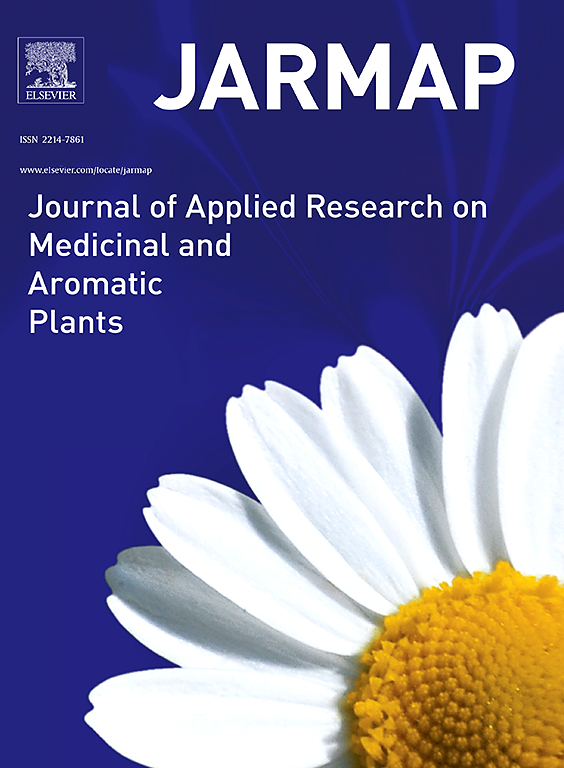St. John's wort root-associated beneficial bacteria with vermicompost augment specialized metabolites without penalizing biomass yield by improving photosynthesis and soil microbial properties
IF 3.6
2区 农林科学
Q1 PLANT SCIENCES
Journal of Applied Research on Medicinal and Aromatic Plants
Pub Date : 2025-10-10
DOI:10.1016/j.jarmap.2025.100670
引用次数: 0
Abstract
Reintroducing beneficial rhizosphere microbes associated with wild medicinal plants back into the rhizosphere during cultivation is expected to increase the efficacy of herbal medicine. However, the effectiveness of this approach for St. John’s wort (Hypericum perforatum L.) has not been explored, nor has it been evaluated alongside other plant biostimulants, such as seaweed extract and non-host-specific plant-beneficial rhizobacteria, that may also impact plant growth and specialized metabolites. To fill these knowledge gaps, in present study a two-year factorial randomized block design experiment was conducted using vermicompost amendment and plant biostimulants, derived from microbial origin (consortia of host plant-associated and non-host-specific plant-beneficial rhizobacteria) and macroalgae-based (seaweed extract). Dry biomass yield of main medicinal material (Hyperici herba) significantly (P = 0.05) influenced by the interaction effect; while contents of specialized metabolites by individual treatments. Seaweed extract significantly maximized the contents of specialized metabolites, particularly pseudohypericin and hypericin; however, it substantially reduced the biomass yield. In both year, biomass yield was not significantly (P > 0.05) influenced by the individual treatment of non-host-specific plant-beneficial rhizobacteria; however, in combination with vermicompost amendment at 5 Mg ha⁻¹ the biomass yield numerically increased compared to the seaweed extract treatment. Nevertheless, specialized metabolites were minimally increased by non-host-specific plant-beneficial rhizobacteria. Unlike seaweed extract and non-host-specific plant-beneficial rhizobacteria, host plant-associated rhizobacteria simultaneously enhanced specialized metabolites, especially hyperforin, and the biomass yield either alone or in combination. Across both years, the maximum biomass yield was achieved under the combined application of host plant-associated plant-beneficial rhizobacteria and vermicompost amendment at 5 Mg ha⁻¹. This treatment also improved net photosynthetic rate, internal water use efficiency, soil microbial biomass carbon, and respiration compared to control and rest of the treatments. Thus, the integrating host plant-associated plant-beneficial rhizobacteria with vermicompost amendment offers a sustainable approach to increase the efficacy of St. John’s wort herbal medicine without compromising the biomass yield.
与蚯蚓堆肥的圣约翰草根相关的有益细菌通过改善光合作用和土壤微生物特性来增加专门的代谢物,而不影响生物量产量
在种植过程中,将与野生药用植物相关的有益根际微生物重新引入根际,有望提高草药的功效。然而,这种方法对圣约翰草(贯叶连翘L.)的有效性尚未被探索,也没有与其他植物生物刺激剂(如海藻提取物和非宿主特异性植物有益根瘤菌)一起评估,这些植物生物刺激剂也可能影响植物生长和特殊代谢物。为了填补这些知识空白,本研究进行了一项为期两年的因子随机区组设计实验,使用蠕虫堆肥添加剂和植物生物刺激剂,这些刺激剂来自微生物来源(宿主植物相关和非宿主特异性植物有益的根瘤菌群)和大型藻类(海藻提取物)。主要药材金丝桃干生物量受互作效应影响显著(P = 0.05);而特定代谢物的含量由个别处理。海藻提取物显著提高了特定代谢物的含量,尤其是假金丝桃素和金丝桃素;然而,它大大降低了生物质产量。在这两个年份,非寄主特异性植物有益根瘤菌单独处理对生物量产量的影响不显著(P >; 0.05);然而,与5 Mg ha(⁻¹ )的蚯蚓堆肥处理相结合,与海藻提取物处理相比,生物量产量在数字上有所增加。然而,非宿主特异性植物有益根瘤菌的特化代谢物增加很少。与海藻提取物和非宿主特有的植物有益根瘤菌不同,宿主植物相关根瘤菌可以单独或联合提高特定代谢物,特别是hyperperforin和生物量产量。在这两年中,在寄主植物相关的植物有益根瘤菌和蚯蚓堆肥添加剂的联合应用下,获得了最大的生物量产量(5 Mg ha⁻¹)。与对照和其他处理相比,该处理也提高了净光合速率、内部水分利用效率、土壤微生物生物量碳和呼吸。因此,整合宿主植物相关的植物有益根瘤菌与蚯蚓堆肥修正提供了一种可持续的方法来提高圣约翰草草药的功效,而不影响生物量产量。
本文章由计算机程序翻译,如有差异,请以英文原文为准。
求助全文
约1分钟内获得全文
求助全文
来源期刊

Journal of Applied Research on Medicinal and Aromatic Plants
Pharmacology, Toxicology and Pharmaceutics-Drug Discovery
CiteScore
6.40
自引率
7.70%
发文量
80
审稿时长
41 days
期刊介绍:
JARMAP is a peer reviewed and multidisciplinary communication platform, covering all aspects of the raw material supply chain of medicinal and aromatic plants. JARMAP aims to improve production of tailor made commodities by addressing the various requirements of manufacturers of herbal medicines, herbal teas, seasoning herbs, food and feed supplements and cosmetics. JARMAP covers research on genetic resources, breeding, wild-collection, domestication, propagation, cultivation, phytopathology and plant protection, mechanization, conservation, processing, quality assurance, analytics and economics. JARMAP publishes reviews, original research articles and short communications related to research.
 求助内容:
求助内容: 应助结果提醒方式:
应助结果提醒方式:


